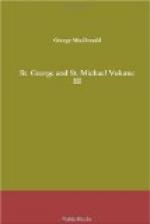’Thou didst not think thou wast doing wrong when thou stolest the mare,’ said Dorothy, seeking to comfort him.
’How know’st thou that, Dorothy? There was a spot in my heart that felt ashamed all the time.’
’He that is sorry is already pardoned, I think, cousin. Then what thou hast done evil is gone and forgotten.’
’Nay, Dorothy. But if it were forgotten, yet would it be. If I forgot it myself, yet would I not cease to be the man who had done it. And thou knowest, Dorothy, in how many things I have been false, so false that I counted myself honourable all the time. Tell me wherefore should I not kill myself, and rid the world of me; what withholdeth?’
‘That thou art of consequence to him that made thee.’
’How can that be, when I know myself worthless? Will he be mistaken in me?’
’No, truly. But he may have regard to that thou shalt yet be. For surely he sent thee here to do some fitting work for him.’
More talk followed, but Dorothy did not seem to herself to find the right thing to say, and retired to the top of the Tower with a sense of failure, and oppressed with helpless compassion for the poor youth.
The doctors of divinity and of medicine differed concerning the cause of his sad condition. The doctor of medicine said it arose entirely from a check in the circulation of the animal spirits; the doctor of divinity thought, but did not say, only hinted, that it came of a troubled conscience, and that he would have been well long ago but for certain sins, known only to himself, that bore heavy upon his life. This gave the marquis a good ground of argument for confession, the weight of which argument was by the divine felt and acknowledged. But both doctors were right, and both were wrong. Could his health have been at once restored, a great reaction would have ensued, his interest in life would have reawaked, and most probably he would have become indifferent to that which now oppressed him; but on the slightest weariness or disappointment, the same overpowering sense of desolation would have returned, and indeed at times amidst the warmest glow of health and keenest consciousness of pleasure. On the other hand, if by any argument addressed to his moral or religious nature his mind could have been a little eased, his physical nature would most likely have at once responded in improvement; but he had no individual actions of such heavy guilt as the divine presumed to repent of, nor could any amount or degree of sorrow for the past have sufficed to restore him to peace and health. It was a poet of the time who wrote,
’The soul’s dark cottage,
battered and decayed,
Lets in new light, through
chinks that time has made:’
sickness had done the same thing as time with Rowland, and he saw the misery of his hovel. The cure was a deeper and harder matter than Dr. Bayly yet understood, or than probably Rowland himself would for years attain to, while yet the least glimmer of its approach would be enough to initiate physical recovery.




